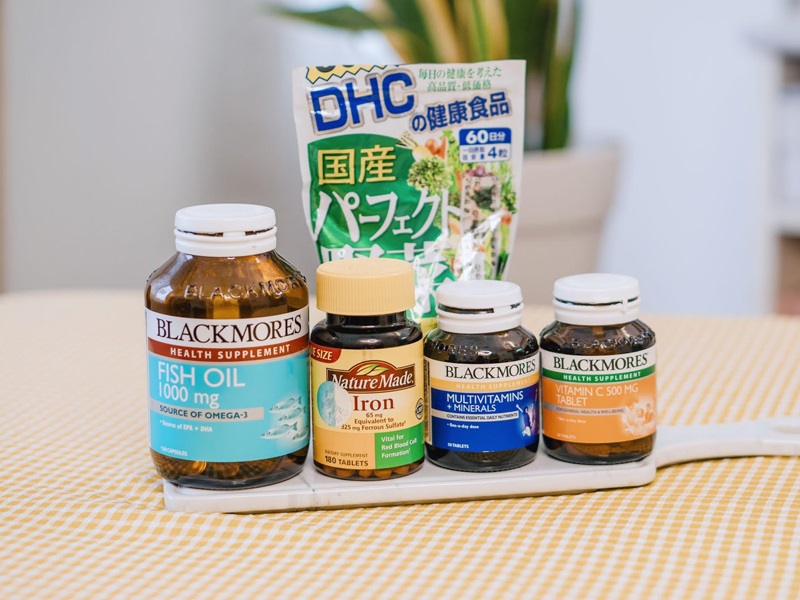What are dietary supplements? What types of dietary supplements are there?
Vitamin, mineral, collagen supplements... are all foods that supplement nutrients for the body. Surely we have heard of functional foods? Although the dosage forms are relatively similar, in reality, functional foods and dietary supplements are not the same!
So, what exactly are dietary supplements? What types of dietary supplements are available today? Don’t forget to check out the article below for the answer!
I. What are dietary supplements? The concept of dietary supplements
Correct Concept of Supplements
Dietary supplements (or dietary supplements) are products intended to supplement the diet containing nutritional ingredients beneficial to health including: Vitamins, minerals, Protein... - According to the definition of the concept of the US Dietary Supplements Health and Education Act of 1994.
With the above concept, we can completely affirm that supplements are NOT drugs and do NOT have the effect of replacing medicine. Experts also warn that this product line does not have the effect of replacing main meals or completely replacing nutrients from natural foods.

Where do dietary supplements come from?
There are nutrients in dietary supplements, so where do these nutrients come from? → All supplements are made from natural ingredients such as: Milk, meat to extract Protein, vegetables to extract Vitamins... Thanks to the advantage of being derived from nature, the user's body can "recharge" the best nutrients for the body.

Confusion between dietary supplements and dietary supplements
Are dietary supplements and functional foods the same thing? The answer is NO! Their names are completely different: “Dietary Supplements” and “Functional Foods”.
→ Functional foods : Supplement nutrients and they can "solve" a certain health problem of the user.
→ Food supplements : Supplement the body's missing nutrients for many different purposes such as: muscle development, skin whitening... You can completely replace food supplements by eating and drinking scientifically.
Pills containing vitamins, Omega 3, minerals, etc. are called dietary supplements by users, but in reality they are all supplements.

Similar to dietary supplements, dietary supplements are also prepared in many forms such as granules - powder, oral solution, and tablets.
In fact, experts consider dietary supplements as a smaller “branch” of dietary supplements!
II. What types of supplements are there?
Nutritional supplements can be divided into four major groups: Vitamin and mineral supplements; Fiber supplements; Foods that balance digestive bacteria; Foods that help with weight loss.
1. Vitamin and mineral supplements
Although the best source of vitamins and minerals is vegetables, fruits and daily foods, for those with limited eating ability and unbalanced diet, this supplement product line is recommended by experts.
Many consumers have the misconception that vitamins and minerals can be used as cold remedies and to help relieve stress. In essence, vitamins and minerals are just organic substances that participate in the body's metabolism → They have no effect in treating diseases!

However, taking too many vitamins is not always good. They can become toxic if users abuse them:
- Excess amounts of Vitamins A, D, E, and K are not eliminated from the body. High doses can cause poisoning.
- Using high doses of water-soluble vitamins can be toxic to the body.
- Taking 1g of excess Vitamin C causes diarrhea
- Using high doses of Vitamin C can cause nausea, abdominal pain, headache, and fatigue.
- High doses of vitamin A cause birth defects, central nervous system disorders
Vitamin and mineral supplements are currently most commonly prepared in pill form: Tablets, hard capsules, soft capsules.
2. Fiber supplements
Besides Vitamins, fiber supplements are also being chosen by many people. When the amount of fiber in vegetables and fruits is not enough to meet the body's needs, this product line will help "make up" for that deficiency! In fact, fiber supplements also contain many other beneficial bacteria and minerals that are good for health.
Providing enough fiber for the body can help improve the stability of the digestive system, prevent appendicitis, irritable bowel syndrome, control weight...

The fiber in this food line can be extracted from: Lignin, Cellulose, Pectin, Gum, Psyllium... They are all natural fibers, taken from plant cells, fruits, and nuts.
3. Food groups that balance digestive bacteria
We are referring to the product line with Probiotic function. Probiotics have the ability to break down difficult-to-digest foods such as fiber and complex carbs. Adding these bacteria helps us fight digestive diseases, balance intestinal microflora, etc.
This product group is prepared in two main forms: Digestive powder and digestive drink for children.

4. Food groups that help lose weight
Note: Weight loss supplements are NOT “magic pills”, just using them you can have a slim figure.
How they work: Helps reduce appetite, reduce fat absorption, increase fat burning in the body.
So, to lose weight successfully you still need to have:
- Scientific diet
- Exercise and weight loss exercises are recommended.
- Scientific living habits: Sleep on time, drink lots of water
- Keep a relaxed mind

You should note that: Do not use weight loss supplements of unknown origin or abuse them because they can cause side effects. Some of the most prominent signs include: diarrhea, bloating, insomnia, restlessness, nausea... Therefore, research the product carefully before using it!
Hopefully, with the information in this article, you have a clearer view of nutritional supplements for the body. Remember to regularly follow NanoFrance's website to update more latest medical and pharmaceutical knowledge!








